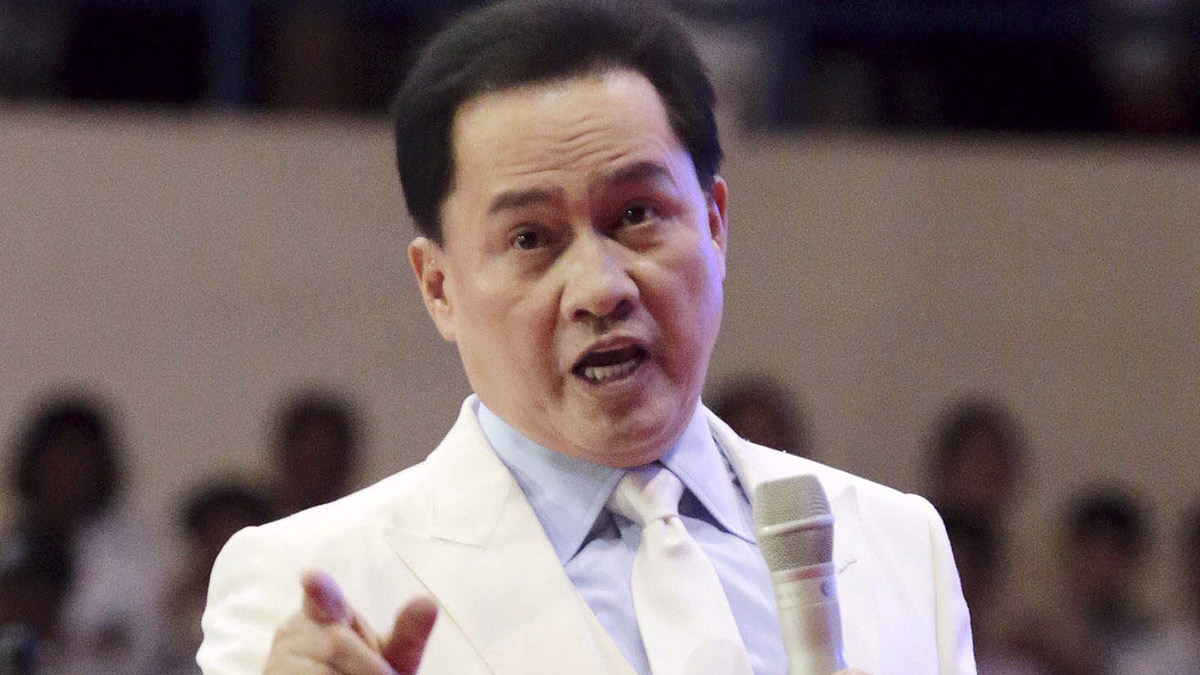
Fugitive televangelist Apollo Quiboloy. —Inquirer file photo
DAVAO CITY, Philippines — The Philippine National Police sent more personnel here for deployment at various points of the Kingdom of Jesus Christ (KJC) compound, as the search for the religious group’s fugitive leader, Apollo Quiboloy, entered its fifth day.
The additional forces started arriving in batches on Tuesday night and came from other parts of Mindanao, according to Brig. Gen. Roderick Augustus Alba, the Davao regional command director for police community relations.
Lt. Gen. Luis Rex Bergante, commander of the Eastern Mindanao Command of the Armed Forces of the Philippines, said the Army would also contribute soldiers—up to four companies—to intensify the operation launched on Aug. 24 to serve arrest warrants on Quiboloy and his four coaccused in connection with their child abuse and human trafficking cases.
READ: Court: TPO doesn’t nullify PNP’s serving of arrest warrant vs Quiboloy
The reinforcements came as police teams stepped up the search in areas of the KJC compound where the wealthy and politically influential pastor is believed to be hiding.
“We’re still looking for him [but] we are now making focused searches,” Brig. Gen. Nicolas Torre III, the Davao regional police chief, told reporters on Wednesday. “We will not do this unless we are very convinced that he is there.”
Torre said they were now looking for entry points to “bunkers’’ in the compound, which they intend to access in a “non-invasive” manner so that “nothing will be destroyed.”
No repeat of protest
At this point in the operation, he said, the police are also making sure that KJC members and their sympathizers will not be able to mount another mass action that can disrupt the search or cause a disturbance in the local community, like what happened on Sunday night when they occupied a stretch of the Carlos P. Garcia Highway.
The commander vowed to respect the temporary protection order (TPO) sought by the KJC and later granted by Regional Trial Branch 15 Judge Mario Duaves, but denied claims that the raiders were restricting the movements of the sect members.
“If they were being restricted [from] going out of the KJC (compound), how were they able to move two firetrucks and two giant cranes?” Torre asked, referring to the vehicles the protesters used as barricades on Sunday. The blockade was set up on the road leading to the compound and also blocked an exit route from Davao International Airport.
“They were the ones putting up restrictions (for the search teams),” Torre stressed. “You should never interfere in the service of a warrant.”
TPO clarified
Journalists allowed entry into the KJC compound on Wednesday found hundreds of police officers resting under the trees and on the lawn.
A police official—one who had seen action in major operations in Mindanao like the 2013 Zamboanga siege, the 2015 Mamasapano assault against the terrorist Marwan, and the 2017 Marawi City siege—said they had not been able to take a bath since being deployed here.
Meanwhile, speaking to reporters, KJC resident minister Carlo Catiil said the group’s legal victory in securing a TPO proved short-lived because Torre did not withdraw his forces and instead “continued their search for (sounds of a) heartbeat,” alluding to the raiders’ use of high-tech equipment.
“He seemed to have a different thinking (from ours) regarding the TPO,” Catiil said.
But Judge Duaves on Wednesday issued a supplemental order clarifying that the TPO “did not cancel or nullify the processes related to warrants of arrest.”

